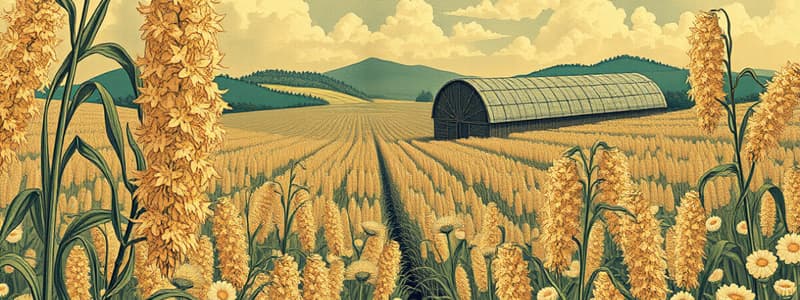Podcast
Questions and Answers
What are Kharif crops primarily characterized by?
What are Kharif crops primarily characterized by?
Which of the following practices is essential for effective weed control?
Which of the following practices is essential for effective weed control?
Which of the following is a primary objective of nutrient management in crop production?
Which of the following is a primary objective of nutrient management in crop production?
What role does crop rotation play in agricultural practices?
What role does crop rotation play in agricultural practices?
Signup and view all the answers
What is a significant challenge facing crop production today?
What is a significant challenge facing crop production today?
Signup and view all the answers
Which irrigation technique is known for conserving water?
Which irrigation technique is known for conserving water?
Signup and view all the answers
What is a major benefit of organic farming?
What is a major benefit of organic farming?
Signup and view all the answers
What is an effective method for preventing spoilage in harvested crops?
What is an effective method for preventing spoilage in harvested crops?
Signup and view all the answers
Study Notes
Crop Production and Management
Importance of Crop Production
- Provides food, fiber, and raw materials.
- Essential for economic stability and growth.
- Supports livelihoods for millions globally.
Types of Crops
-
Kharif Crops (Monsoon crops)
- Sown during the rainy season (June to September).
- Examples: Rice, maize, cotton, soybeans.
-
Rabi Crops (Winter crops)
- Sown in winter (October to March).
- Examples: Wheat, barley, peas, mustard.
-
Zaid Crops
- Grown between Kharif and Rabi seasons.
- Examples: Watermelon, cucumber, and vegetables.
Crop Production Practices
-
Soil Preparation
- Tilling: Mixing and turning soil to enhance aeration.
- Plowing: Breaks up soil for planting.
-
Sowing
- Methods: Broadcasting, dibbling, and transplanting.
- Importance of seed quality and spacing.
-
Water Management
- Irrigation techniques: Drip, sprinkler, and surface irrigation.
- Importance of water conservation.
-
Nutrient Management
- Application of fertilizers (organic and chemical).
- Importance of soil testing to determine nutrient needs.
-
Weed Control
- Manual weeding and chemical herbicides.
- Impact of weeds on crop growth and yield.
-
Pest and Disease Management
- Integrated Pest Management (IPM) practices.
- Use of pesticides, crop rotation, and resistant varieties.
Harvesting
- Timing and methods of harvesting to ensure quality.
- Manual vs. mechanical harvesting techniques.
Storage and Preservation
- Importance of proper storage to prevent spoilage and pest damage.
- Techniques: Use of silos, cold storage, and packaging.
Agricultural Practices
- Crop Rotation: Improves soil health and reduces pests.
- Intercropping: Growing two or more crops in proximity for benefits.
- Organic Farming: Minimizing chemical use and promoting biodiversity.
Challenges in Crop Production
- Climate change impacts (droughts, floods).
- Soil degradation and depletion of nutrients.
- Pest resistance and loss of biodiversity.
Technological Advancements
- Use of biotechnology (GMOs).
- Precision farming and use of drones for monitoring crops.
- Development of high-yielding and disease-resistant varieties.
Importance of Crop Production
- Integral to providing food, fiber, and raw materials for various industries.
- Crucial for economic stability and sustainable growth across countries.
- Essential source of livelihood for millions worldwide.
Types of Crops
-
Kharif Crops:
- Dependent on monsoon season; planted from June to September.
- Principal crops include rice, maize, cotton, and soybeans.
-
Rabi Crops:
- Cultivated in the winter months; sown from October to March.
- Common examples are wheat, barley, peas, and mustard.
-
Zaid Crops:
- Grown in the transitional period between Kharif and Rabi seasons.
- Notable crops include watermelon, cucumber, and various vegetables.
Crop Production Practices
-
Soil Preparation:
- Tilling enhances soil aeration through mixing and turning the soil.
- Plowing breaks up soil to create suitable planting conditions.
-
Sowing:
- Strategies include broadcasting, dibbling, and transplanting to ensure optimal planting.
- Seed quality and proper spacing are critical for successful growth.
-
Water Management:
- Various irrigation methods such as drip, sprinkler, and surface irrigation are employed.
- Water conservation is vital for sustainable agricultural practices.
-
Nutrient Management:
- Incorporates organic and chemical fertilizers based on soil testing results.
- Soil testing determines the specific nutrient requirements for crops.
-
Weed Control:
- Employs manual weeding alongside chemical herbicides to combat competition from weeds.
- Effective weed control is essential for maximizing crop yield.
-
Pest and Disease Management:
- Integrates IPM practices that include pesticides, crop rotation, and use of resistant varieties.
Harvesting
- Correct timing and selection of harvest methods are key for ensuring crop quality.
- Techniques vary between manual and mechanical harvesting approaches.
Storage and Preservation
- Proper storage solutions are necessary to minimize spoilage and pest damage.
- Utilization of silos, cold storage facilities, and suitable packaging methods helps maintain crop integrity.
Agricultural Practices
- Crop Rotation: Enhances soil health while minimizing pest populations.
- Intercropping: Involves growing multiple crops in close proximity for ecological benefits.
- Organic Farming: Focuses on reducing chemical usage and fostering biodiversity within ecosystems.
Challenges in Crop Production
- Climate change results in extreme weather events, including droughts and floods that threaten crop yields.
- Soil degradation lead to nutrient depletion, impacting long-term agricultural productivity.
- Rising pest resistance and reduction in biodiversity complicate crop management strategies.
Technological Advancements
- Biotechnology applications, including genetically modified organisms (GMOs), increase crop resilience and yield.
- Precision farming techniques utilize drones for real-time crop monitoring and data analysis.
- Ongoing development of high-yielding and disease-resistant crop varieties enhances productivity.
Studying That Suits You
Use AI to generate personalized quizzes and flashcards to suit your learning preferences.
Description
Explore the significance of crop production and management in supporting food security and economic stability. Learn about the different types of crops such as Kharif, Rabi, and Zaid, along with essential practices like soil preparation and water management techniques. This quiz will test your knowledge on vital agricultural concepts.




